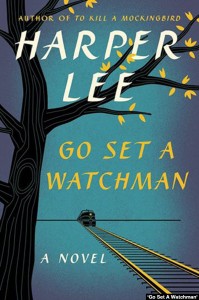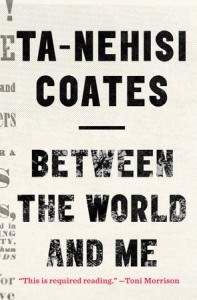There are a few spoilers about themes and one scene in GSAW in the text that follows.
Last Tuesday morning I headed to my local bookstore to buy two brand-new books, Harper Lee’s Go Set a Watchman and Ta-Nehisi Coates’ Between the World and Me
. They were both good reads, and interesting to read together as they both directly addressed the subject of race.
The literary world has been abuzz since it was announced that Lee was publishing an unedited manuscript, an early draft of the novel that would be our beloved To Kill a Mockingbird.
Generally, as a novel, I am not sure that Go Set a Watchman works apart from To Kill a Mockingbird. It is so dependent and tied to it that I find it hard to believe the story that it was a first draft. It feels more like a sequel that was too heavy-handed to publish without significant editing to help Lee do more showing and less telling. To Kill a Mockingbird is a great book; Go Set a Watchman is an interesting read.
Early readers of Go Set a Watchman were aghast at the fall of Atticus, a hero to so many. But it is obvious that Atticus did not fall, as much as Scout discovered that her father had feet of clay. It is one of the universal experiences of growing up, to discover that a hero is not the person you thought him to be, but a flawed and complicated individual.
The racism that Atticus demonstrates is very representative of his day and class, with a paternalism that many saw—and continue to see—as good. Their racism becomes whitewashed by their intentions and is then easily explained away. As Coates says, “There are no racists in America, or at least none that the people who need to be white know personally.”
What Scout discovers is that race is a much bigger deal in Maycomb than she innocently believed. The turning point is when she visits Calpurnia, the black household maid and cook who raised her. As Scout experiences the coldness and distance between them, she is shaken to the core, thinking, “She loved us, I swear she loved us. She sat there in front of me and she didn’t see me, she saw white folks. She raised me, and she doesn’t care.”
When whites have all the power in a relationship and in the culture, how does that shape that relationship and that culture? What if that has been the case for generation after generation? These fundamental and core problems make simple things like Scout declaring herself color blind an insufficient response to racism.
This is why America needs the prophetic voice of writers like Ta-Nahisi Coates. His perspective and his worldview are so alien from my own, his words force me to grapple with things previously foreign. In order for things in our country to change, we need Coates to write, and the majority culture needs to listen.
Between the World and Me is a small, slim book. There are so many passive-aggressive missives these days that calling the book an open letter feels wrong, but it is a letter to Coates’ adolescent son about what it means to be a black man in America and an homage to similar letters written in the past.
The letter is often intimate and personal, the stories are intentionally visceral and provocative. There is an urgency to Between the World and Me that could be summarized in part with Coates’ own words. “Black people love their children with a kind of obsession. You are all we have, and you come to us endangered. I think we would like to kill you ourselves before seeing you killed by the streets that America made.” This dark reality could be crushing but there is levity and hopefulness in the midst of it, glimmers of joy.
There is a moment in To Kill a Mockingbird where Atticus tells his daughter a truth we’ve all heard. “First of all,” he said, “If you can learn a simple trick, Scout, you’ll get along a lot better with all kinds of folks. You never really understand a person until you consider things from his point of view… until you climb into his skin and walk around in it.”
Maybe it is better to acknowledge that the best way to do that is to listen, really listen to other perspectives. I will never truly know what it is like to be someone else because I can’t climb into his skin and walk around in it. Instead of trying too hard to work on his behalf paternalistically, I should get out of his way and let him speak for himself.



Just finished Go Set a Watchman this week and I’m glad I sought out your review. I need to read BTW&M next, b/c I felt like GSAW offered no alternative to that paternalistic viewpoint and I felt so empty after reading it.